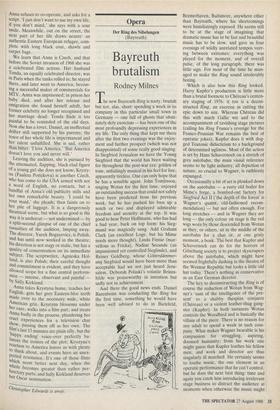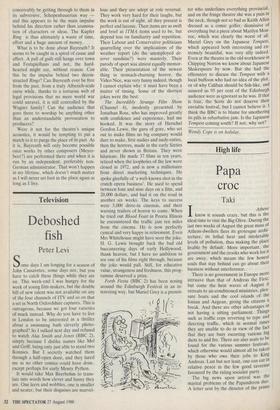Opera
Bayreuth brutalism
Rodney Milnes
he new Bayreuth Ring is nasty, brutish but not, alas, short: spending a week in its company in this particular small town in Germany — one full of ghosts that obsti- nately defy exorcism — has been one of the most profoundly depressing experiences in my life. The only thing that kept me there after the first two evenings was the enjoy- ment and further prospect (which was not disappointed) of some really good singing. In Siegfried Jerusalem we have the Young Siegfried that the world has been waiting for throughout the post-war era: golden of tone, unfailingly musical in his feel for line, apparently tireless. One can only hope that he has a sensible agent. John Tomlinson, singing Wotan for the first time, enjoyed an outstanding success that could not safely have been predicted from his previous work, but he has pushed his bass up a notch or two and displayed admirable freedom and security at the top. It was good to hear Peter Hoffmann, who has had a bad year, back on top form: his Sieg- mund was magically sung. Add Graham Clark (an excellent Loge, but his Mime needs more thought), Linda Finnie (mar- vellous as Fricka), Nadine Secunde (an impassioned yet controlled Sieglinde), and Reiner Goldberg, whose Gotterdlimmer- ung Siegfried would have been more than acceptable had we not just heard Jeru- salem. Deborah Polaski's volatile Briinn- hilde was praiseworthy in intention but sadly not in achievement. And there the good news ends. Daniel Barenboim was conducting the Ring for the first time, something he would have been well advised to do in Bielefeld, Bremerhaven, Baltimore, anywhere other than Bayreuth, where his shortcomings were humiliatingly exposed. He seems still to be at the stage of imagining that dramatic music has to be fast and beautiful music has to be slow, and gave us four evenings of wildly unrelated tempos veer- ing between extremes: everything was played for the moment, and of overall pulse, of the long paragraph, there was little sign. For most of the time he man- aged to make the Ring sound intolerably boring.
Which is also how this Ring looked. Harry Kupfer's production is little more than a brutal footnote to Chereau's centen- ary staging of 1976: it too is a decon- structed Ring, an exercise in cutting the epic down to size. Whereas Chereau did this with much Gallic wit and to the accompaniment of ravishing stage pictures (calling his Ring France's revenge for the Franco-Prussian War remains the best of operatic jokes), Kupfer does it with dog- ged Teutonic didacticism to a background of determined ugliness. Most of the action is set by Hans Schavernoch on a stretch of grey autobahn; the main visual reference seems to be light industry; all depiction of nature, so crucial to Wagner, is ruthlessly expunged.
Occasionally a bit of set is plonked down on the autobahn — a rusty old boiler for Mime's forge, a bombed-out factory for Siegfried Act II ('the depth of the forest' is Wagner's quaint, old-fashioned recom- mendation) — but not often enough. For long stretches — and in Wagner they are long — the only colour on stage is the red wigs worn by those descended from Wotan as they, or others, sit in the middle of the autobahn for a chat or, at one grisly moment, a bonk. The best that Kupfer and Schavernoch can do for the horrors of Gibichung society is to project skyscrapers above the autobahn, which might have seemed frightfully dashing in the theatre of the Weimar Republic but looks a little old hat today. There's nothing as conservative as an East German director.
The key to deconstructing the Ring is of course the reduction of Wotan from Wag- ner's 'sum of the intelligence of the pre- sent' to a shabby thespian conjuror (Chereau) or a violent leather-thug gang- ster (Kupfer). In both instances Wotan controls the Woodbird and is basically the villain of the piece. There is no reason for any adult to spend a week in such com- pany. What makes Wagner bearable is his compassion for struggling, aspiring, doomed humanity; from his work one might guess that Kupfer loathes his fellow men, and work and director are thus singularly ill matched. He certainly seems to loathe music, the one element in an operatic performance that he can't control, but he does the next best thing: time and again you catch him introducing irrelevant stage business to distract the audience at moments when otherwise the music might conceivably be getting through to them in its subversive, Schopenhauerian way — and this appears to be the main impulse behind his direction rather than illumina- tion of characters or ideas. The Kupfer Ring is thus ultimately a waste of time, effort and a huge amount of money.
What is to be done about Bayreuth? It seems to be caught in a spiral of cause and effect. A pall of guilt still hangs over town and Festspielhaus and not, the hard- hearted might say, without reason. Can this be the impulse behind two decon- structed Rings? Can Bayreuth ever be free from the past, from a truly Alberich-scale curse while, thanks to a tortuous web of legal provisions that no mere world war could unravel, it is still controlled by the Wagner family? Can the audience that goes there to worship be anything other than an understandable provocation to producers?
Were it not for the theatre's unique acoustics, it would be tempting to put a match to it to purge the place of its past. As it is, Bayreuth will only become possible once works by other composers (Meyer- beer?) are performed there and when it is run by an independent, preferably non- German administrator. That won't happen in my lifetime, which doesn't much matter as I will never set foot in the place again as long as [live.















































 Previous page
Previous page